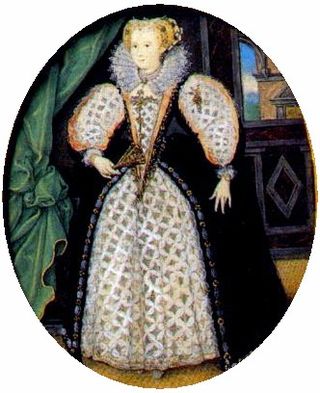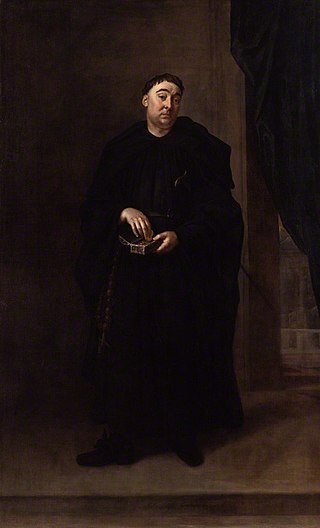Related Research Articles

George Chapman was an English dramatist, translator and poet. He was a classical scholar whose work shows the influence of Stoicism. William Minto speculated that Chapman is the unnamed Rival Poet of Shakespeare's sonnets. Chapman is seen as an anticipator of the metaphysical poets of the 17th century. He is best remembered for his translations of Homer's Iliad and Odyssey, and the Homeric Batrachomyomachia.

Richard Brome ; was an English dramatist of the Caroline era.

Penelope Rich, Lady Rich, later styled Penelope Blount was an English court office holder. She served as lady-in-waiting to the English queen Anne of Denmark. She was the sister of Robert Devereux, 2nd Earl of Essex, and is traditionally thought to be the inspiration for "Stella" of Sir Philip Sidney's Astrophel and Stella sonnet sequence. She was married to Robert Rich, 3rd Baron Rich and had a public liaison with Charles Blount, Baron Mountjoy, whom she married in an unlicensed ceremony following her divorce from Rich. She died in 1607.

Lady Mary Wroth was an English noblewoman and a poet of the English Renaissance. A member of a distinguished literary family, Lady Wroth was among the first female English writers to have achieved an enduring reputation. Mary Wroth was niece to Mary Herbert née Sidney, and to Sir Philip Sidney, a famous Elizabethan poet-courtier.
Epicœne, or The Silent Woman, also known as Epicene, is a comedy by Renaissance playwright Ben Jonson. The play is about a man named Dauphine, who creates a scheme to get his inheritance from his uncle Morose. The plan involves setting Morose up to marry Epicoene, a boy disguised as a woman. It was originally performed by the Blackfriars Children, or Children of the Queen's Revels, a group of boy players, in 1609. Excluding its two prologues, the play is written entirely in prose.
No Wit, No Help Like a Woman's is a Jacobean tragicomic play by Thomas Middleton.
The Court Beggar is a Caroline era stage play written by Richard Brome. It was first performed by the acting company known as Beeston's Boys at the Cockpit Theatre. It has sometimes been identified as the seditious play, performed at the Cockpit in May 1640, which the Master of the Revels moved to have suppressed. However, the play's most recent editor, Marion O'Connor, dates it to "no earlier than the end of November 1640, and perhaps in the first months of 1641".
The English Moor, or the Mock Marriage is a Caroline era stage play, a comedy written by Richard Brome, noteworthy in its use of the stage device of blackface make-up. Registered in 1640, it was first printed in 1659, and, uniquely among the plays of Brome's canon, also survives in a manuscript version.

The Antipodes is a Caroline era stage play, a comedy written by Richard Brome c. 1636. Many critics have ranked The Antipodes as "his best play...Brome's masterpiece," and one of the best Caroline comedies – "gay, imaginative, and spirited...;" "the most sophisticated and ingenious of Brome's satires." Brome's play is "a funhouse mirror" in which the audience members could "view the nature of their society."
The Sparagus Garden is a Caroline era stage play, a comedy by Richard Brome. It was the greatest success of Brome's career, and one of the major theatrical hits of its period.
The Wild Gallant is a Restoration comedy written by John Dryden. It was Dryden's earliest play, and written in prose, except for the prologue, and the epilogue, which are in verse. It was premiered on the stage by the King's Company at their Vere Street theatre, formerly Gibbon's Tennis Court, on February 5, 1663. As Dryden himself stated in his Preface, it was "the first attempt I made in Dramatique Poetry."
The Mistaken Husband is a Restoration comedy in the canon of John Dryden's dramatic works, where it has constituted a long-standing authorship problem.
The New Academy, or the New Exchange is a Caroline era stage play, a comedy written by Richard Brome. It was first printed in 1659.
The City Wit, or the Woman Wears the Breeches is a Caroline era stage play, a comedy written by Richard Brome that is sometimes classed among his best works. It was first published when it was included in the Five New Plays of 1653, the collection of Brome works published by Humphrey Moseley, Richard Marriot, and Thomas Dring.
A Mad Couple Well-Match'd is a Caroline era stage play, a comedy written by Richard Brome. It was first published in the 1653 Brome collection Five New Plays, issued by the booksellers Humphrey Moseley, Richard Marriot, and Thomas Dring.
The Damoiselle, or the New Ordinary is a Caroline era stage play, a comedy by Richard Brome that was first published in the 1653 Brome collection Five New Plays, issued by Humphrey Moseley, Richard Marriot, and Thomas Dring.
Katherine Corey was an English actress of the Restoration era, one of the first generation of female performers to appear on the public stage in Britain. Corey played with the King's Company and the United Company, and had one of the longest careers of any actress in her generation. In "The humble petition of Katherine Corey", she stated that she "was the first and is the last of all the actresses that were constituted by King Charles the Second at His Restauration."

Anthony Leigh was a celebrated English comic actor.
The Innocent Mistress is a comedy written by Mary Pix, first performed in 1697.
George Bright was an English stage actor of the seventeenth and early eighteenth century. He specialised in playing "comic dullards, fops and bouncy servants". After beginning his career in Dublin he joined the Duke's Company at the Dorset Garden Theatre in 1679 and then became part of the merged United Company in 1682.
References
- Andrews, Clarence Edward. Richard Brome: A Study of His Life and Works. New York, Henry Holt, 1913.
- Clark, Ira. "The Widow Hunt on the Tudor-Stuart Stage". SEL: Studies in English Literature 1500–1900, Vol. 41 No. 2 (Spring 2001), pp. 399–416.
- Ingram, R. W. "Operatic Tendencies in Stuart Drama", The Musical Quarterly Vol. 44 No. 4 (October 1958), pp. 489–502.
- Steggle, Matthew. Richard Brome: Place and Politics on the Caroline Stage. Manchester, Manchester University Press, 2004.